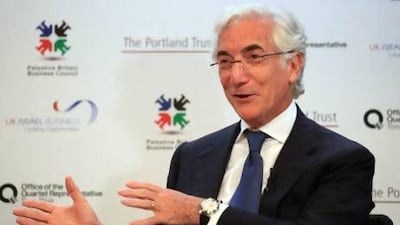Sir Ronald Cohen is not exactly crowing, but he must have felt a moment of personal satisfaction at the World Economic Forum in Jordan in May.
John Kerry, the US secretary of state, had just announced a US$4 billion plan to kick-start Israel-Palestinian Territories peace talks.
"We need an understanding of the role economics can play in the peace process," said Mr Kerry.
Sir Ronald, who was at the Forum that day, can claim to have been arguing exactly that since 2003 when, after a career at the pinnacle of the global venture capital business, he formed the Portland Trust, a British non-profit "action tank" to promote peace and stability in the Palestinian Territories through economic development.
"It was set up to work on the economic dimension of the peace process. We realised we couldn't just work on one side, so it had to look at both Israel and Palestine, with different strategies for each."
In Jordan, apart from Mr Kerry's initiative, there was another example of a strategy towards peace in a business framework with the "breaking the impasse" plan, aimed at getting Israeli and Arab business leaders in the region working together. Sir Ronald was involved in that from its inception.
"There has to be a vision of a more prosperous future. We must stop looking backward at the causes of conflict, and try to see what the future might hold," he says.
You might think those are the easy words of a wealthy philanthropist, but Sir Ronald has direct experience of the suffering and dislocation conflict can cause in the Middle East.
Born in Egypt, as a teenager in 1957 he and his family became penniless refugees from their home in Cairo after the Suez conflict, settling in London because of his mother's British nationality.
Education at Oxford and Harvard was followed by a stint at the management consultant McKinsey, which he left to start Apax Partners, one of the first venture capital firms in Britain.
Apax grew to become one of the world's biggest and most successful firms, arranging start-up or buy-out finance for some of the biggest deals for 30 up-and-down years of the corporate cycle, and for some of the most successful start-ups in history - Virgin, Apple and AOL among them. Sir Ronald became a multimillionaire.
But after three decades with traditional private equity and venture capital work at Apax, he became more focused on a new concept: social investment, which he defines as "a financial investment designed to achieve a social improvement.
It marks a change from "philanthropic giving to philanthropic investing". He advised the UK government on how to organise a policy for social investment, then headed the Commission on Unclaimed Assets, which sought to use the hundreds of millions of pounds in dormant bank accounts for public investment purposes.
His plans have had significant beneficial outcomes in local projects to reduce prisoner recidivism, tackle homelessness and illiteracy.
Most recently he was the chairman of Big Society Capital, the United Kingdom's first social investment bank.
Meanwhile, the Portland Trust was becoming increasingly active in the Palestinian Territories, designing and implementing plans in the economic infrastructure, such as affordable housing and alternative energy schemes, as well as the financial infrastructure of the West Bank - micro-finance, loan guarantees and other credit facilities.
So what does he think of Mr Kerry's $4bn initiative? "It's intended to develop the Palestinian economy but as yet there are no details on where the money is coming from and where it will be invested, as far as I am aware. But there has to be progress towards peace for it to work. The US is not going to pump $4bn if there is no progress towards peace," he says.
Of the "breaking the impasse" initiative, in which 300 Arab and Israeli business people pledged to work together to relaunch the peace process, he says: "Business has shown it is able to play a role in conflict resolution, in South Africa and Northern Ireland.
"In those situations, contacts between political representatives were often not acceptable, but business connections are.
"There are now constant meetings between the two sides, in rather more informal meetings.
The challenge in these kind of situations is you often cannot achieve too much if it's all in the open. It's much better if these things go on behind the scenes."
The Portland Trust is working on an assessment of the Palestinian economy, with the help of McKinsey, which aims to show there is scope for the kind of high growth, low unemployment conditions highlighted by Mr Kerry.
"It will show Israeli and West Bank politicians have many common interests in the economy of the region.
"We also want to encourage greater momentum to economic and political efforts by the UAE, Saudi Arabia and the Arab League," he says.
Will these plans - by Mr Kerry, Israeli and Arab businessmen and the Portland Trust - get the level of political support necessary to be effective? "There has to be political buy-in," he says.

